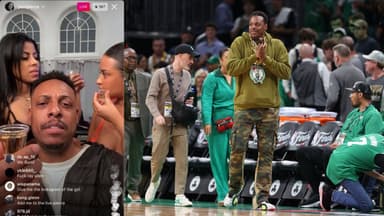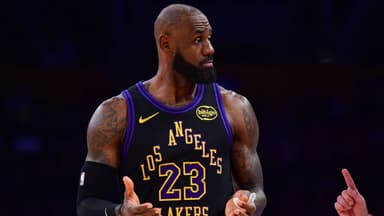The Los Angeles Lakers are the most famous franchise in the NBA and one of the most well-known teams in the world. Being based in Hollywood and having a long line of all-time greats that includes Elgin Baylor and Jerry West, Kareem Abdul-Jabbar and Magic Johnson, and Shaquille O’Neal and Kobe Bryant will do that. The Lakers have always been larger than life.
Advertisement
On Byron Scott’s Fast Break, the Lakers are often the subject of conversation. Scott is a Laker through and through, both as a former player and former coach for the franchise, and his co-host Kid Jay has a long history with the team, as well. If there’s one place to find interesting Lakers discussion, this is it.
Former Lakers guard Norm Nixon was a guest on the show this week, and his appearance prompted what turned out to be a really fascinating discussion. Nixon was one of the main characters on the HBO show Winning Time: The Rise of the Lakers Dynasty, and even more interestingly, he was played on-screen by his real life son, just as O’Shea Jackson Jr. once played his dad Ice Cube on Straight Outta Compton.
Winning Time ran for two seasons, and though it was based on real people and events, it also took some creative liberties which Nixon didn’t appreciate. “You gotta remember, I’m from Macon, Georgia,” he said. “It’s not New York City, Chicago. So how can I call anybody ‘country?’ Second thing, they had me playing basketball in a fur coat in the summertime. Never owned a fur coat!” he noted.
Nixon also took issue with the way his character disrespected women, adding,“I was raised by my mother, my grandmother, my great aunt,” he said. “I didn’t call women b****** and h*** and all that stuff. That wasn’t in my makeup, I have too much respect … None of that was me.”
He made an interesting distinction that I think is pretty accurate when he said that people that knew him and his teammates didn’t care for the show, while people that didn’t know them did enjoy it.
There’s no doubt that the show sensationalized the Lakers lifestyle and the personalities of those involved. Jerry West probably took the worst of it, as he was portrayed as a lunatic with anger management issues, but in real life people have had nothing but good things to say about him. Kareem, Magic and others have also said that they had issues with the way they were characterized.
Nixon encouraged his son to take the role, but he gave him a funny piece of advice. He said, “My son played me, and I told my son, I said, ‘Listen dude, go get your check, go feed yourself, but don’t make me look too stupid.'”
Nixon said that after the show aired, people would approach him to talk about things his character had done on-screen. “You get outside L.A., people thought that it was a documentary. They enjoyed it,” he said. He said he wouldn’t even answer when people assumed that the show’s events were all real, which is certainly his right.
Winning Time is like a game of telephone, where each time the message is passed, it changes a bit. The show was based on Jeff Pearlman’s book Showtime: Magic, Kareem, Riley, and the Los Angeles Lakers Dynasty of the 1980s.
Pearlman is a former writer with Sports Illustrated and has written many sports books, with subjects ranging from the 1986 New York Mets, to the 1990s Dallas Cowboys, to Walter Payton. He even wrote a second Lakers book on the Shaq-Kobe years.
Some of Pearlman’s observations have been disputed by those involved, but his books are based on his actual reporting. Once the book was adapted for the screen, the creative license taken by those writers changed things even more. Then of course you have the director and the actors all putting their own spin on things.
The problem is that this a world where media literacy isn’t exactly very high. The line between fiction and nonfiction isn’t just blurred, it’s completely distorted. Do producers of a show like this have a responsibility to give perfectly accurate representations of their subjects?
As long as a show isn’t attempting to pass itself off as a documentary, which Winning Time wasn’t, it is fair game. However, an argument is to be made about the way the show was shot, and the general way biopics are perceived by an audience, especially when they are popularized by YouTube shorts.








